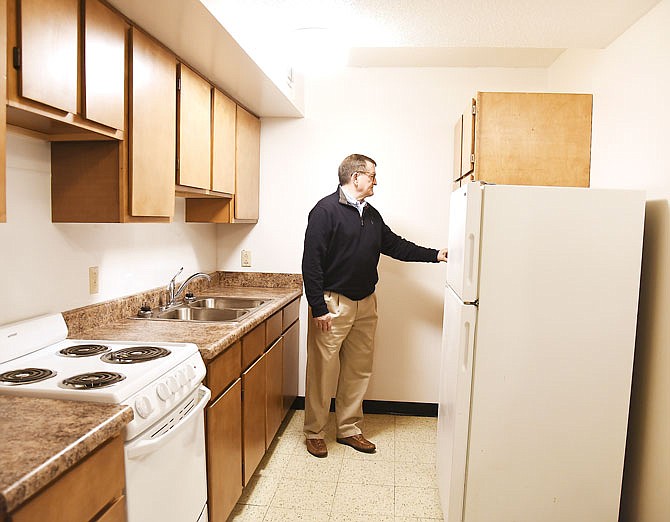Despite a large drop in occupancy at Dulle Tower, the Jefferson City Housing Authority is experiencing a high need for public housing.
Normally having occupancy in the 98-100 percent range, Dulle Tower only has about 54 percent of its 83 units occupied currently, Housing Authority Director Cynthia Quetsch said.
The dramatic drop in occupancy at the 10 Jackson St. property is due to renovations in the apartments' kitchens, Quetsch said during a tour of the apartments Tuesday. Each apartment will receive modernized cabinets and countertops, and contractor MegAllie will replace the lateral sewer lines.
To ensure each apartment receives a facelift, the Housing Authority has been shuffling around Dulle Tower tenants, who must be 50 years or older or disabled to live there. If someone moved out of Dulle Tower, that apartment was also left vacant so MegAllie could renovate it before a new tenant moved in.
Under normal circumstances, the United States Department of Housing and Urban Development would give the Housing Authority about 14 days to fill the vacant apartments. If those vacancies were not filled in that time frame, it would impact the Housing Authority's funding.
Due to the renovations though, the vacancies in Dulle Tower are "HUD approved," Housing Authority chief housing officer Michelle Wessler said. This means the Housing Authority's current vacancies will not impact its funding from HUD.
"The occupancy at Dulle Tower, even though it's at 50 percent, it's still considered completely occupied because we're still being funded as if we're 100 percent occupied because those are HUD-approved vacancies," she said. "We're still being funded so that we can still operate the property while it's going under this renovation. Even though you do see that lower occupancy rate, it isn't a financial burden."
With the wait list for Dulle Tower growing, Quetsch said she is "entirely confident" the tower will reach at least 90 percent occupancy within a few months of renovations wrapping up, which is projected for July 1.
"They're going to be a lot nicer than what they were before, and it's a great location," she said. "It's funny because a lot of people said they wanted to live on the same floor or have the same view they had, which we assumed was people wanting river views, but in fact some people said they wanted to watch the excitement of downtown."
Having a high occupancy rate is common at the Housing Authority's properties. The Housing Authority is in charge of 997 units - counting public housing and Section 8 vouchers - and those units normally have a 90 percent or higher occupancy rate, Quetsch said.
At Hamilton Tower - where residents must also be 50 years or older or disabled - 97.5 percent of its 120 total beds were occupied as of Dec. 31, Quetsch said.
Slightly more than 90 percent of Capital City Apartments' 45 units were occupied as of Dec. 31, she added.
Of Hyder Apartment's 116 units, 93.5 percent were occupied as of Dec. 31, Quetsch said, and 92.5 percent of Ken Locke's 61 beds were occupied. Hyder Apartments serves residents 62 or older while Ken Locke tenants must be 55 years or older.
Herron, Linden Court and LaSalette apartments had 100 percent occupancy as of Dec. 31, Quetsch added.
To live in the LaSalette, Herron and apartments, tenants must be 55 years or older. To live at Linden Court, tenants must be disabled.
Of the 201 total units offered in the public housing neighborhoods, nearly 96 percent were occupied as of Dec. 31, Quetsch said.
HUD requires public housing to have a 97 percent or higher occupancy rate to receive full funding, Wessler said.
Dulle, Linden Court and the public housing neighborhoods are the only public housing facilities the Housing Authority operates.
The high occupancy rate is due to public housing in Jefferson City being desirable and needed, Quetsch said.
"If you were looking at our apartments on a scheme of apartments, it would not be your first choice because they're older, not as spacious as some of the more modern apartments, and they don't have the amenities - no central, dishwashers, microwave," Quetsch said. "If you were in the market, those are things you would want but unfortunately for many low-income individuals, their budget doesn't permit them to qualify for those amenities so they come here.
"Some people stay a long time because they're happy here and it suits their needs, and some people are here until they can afford to move into a better apartment."
Despite the growing need and high occupancy rate, Quetsch said, the Housing Authority does not have plans to build another public housing facility. Along with the high price tag to construct another public housing building, she added, the Housing Authority does not own property in Jefferson City that would be easy to build on.
To help some people on the waiting list, housing authorities in the area communicate and let each other know when they are searching for tenants. For example, Quetsch said, if the Mexico Housing Authority has an abundance of two-bedroom apartments, the Jefferson City Housing Authority will let the people on its wait list know.
The Housing Authority also advertises when it has more apartments than wait list people. This happens occasionally with Hyder Apartments, where the age requirement is 62 or older. Since the pool of eligible people is smaller, Wessler said, it's common for the apartment to have a higher vacancy average compared to the other properties. However, she added, Hyder Apartments still rarely goes below 90 percent occupied.
The 97 percent threshold outlined by HUD does not apply to Hyder, Ken Locke, LaSalette, Herron, Hamilton or Capital City apartments since they are not considered public housing.
The Housing Authority does not experience issues when keeping other properties that have an age requirement full, Wessler said.

